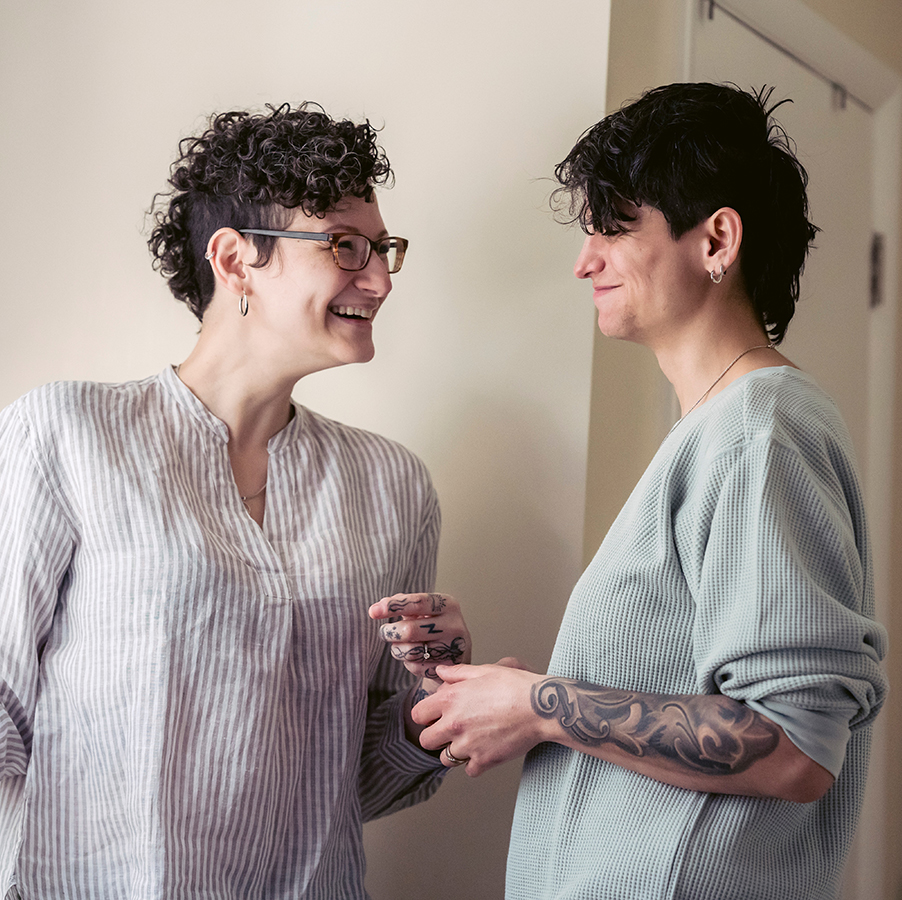LGBTQIA+ Resources and Education
Lesbian and Bisexual Women
Lesbian and bisexual women are part of a diverse community. While all women have specific health risks, lesbian and bisexual women are at a higher risk for certain diseases than other women.Find information and resources from the CDC, other government agencies, and community partners addressing lesbian and bisexual women’s health.

-
General Health Resources
- What You Should Discuss with Your Health Care Provider (GLMA)
- Recognizing the Needs of Lesbian, Bisexual, and Transgender Women (HHS Office on Women’s Health)
- Gay, Lesbian, Bisexual and Transgender Health (Medline Plus)
-
U.S. Government Resources
- Bullying and LGBTQ Youth (StopBullying.gov)
- President Obama and the LGBT Community (The White House)
CDC
- Health Considerations for LGBTQ Youth
- STD Treatment Guidelines: Special Populations – Women Who Have Sex with Women
- 2020 Topics and Objectives for LGBT Health (HealthyPeople.gov)
HHS
- Plan for Health Data Collection on Lesbian, Gay, Bisexual and Transgender (LGBT) Populations (Office of Minority Health)
- Health & Well-being for Lesbian, Gay, Bisexual and Transgender Americans
SAMHSA
-
CDC and Partner Resources
-
More Information
Gay and Bisexual Men
Heart disease and cancer are the leading causes of death for all men, according to the CDC. However, men who have sex with men are additionally affected by higher rates of HIV and other sexually transmitted diseases (STDs), tobacco and drug use and depression. It is essential to understand the health disparities for this population.
-
General Health Resources
-
CDC Mental Health Resources
Transgender Individuals
Understanding transgender individuals and their unique health needs is critical to improving health outcomes for this population. Healthcare providers need to learn about the identities, lives and health needs of their transgender patients to provide affirming and effective care.
-
General Health Information
- HIV and Transgender People
- HIV and Transgender Communities
- HIV Surveillance Report: HIV Infection, Risk, Prevention, and Testing Behaviors Among Transgender Women
- UCSF Center of Excellence for Transgender Health
- Ten Things Transgender Persons Should Discuss with Their Health Care Provider (GLMA)
- CDC HIV Risk Reduction Tool
-
Resources for Healthcare Providers and Public Health Professionals
- HIV Prevention and Care for Transgender People
- Toolkit for Providing HIV Prevention Services to Transgender Women of Color
- LGBT Health Equity (HRSA)
- Eight Best Practices for HIV Prevention among Trans People (University of California, San Francisco)
- Guidelines for Care of Lesbian, Gay, Bisexual, and Transgender Patients (GLMA)
- Transgender Health Resources (American Medical Student Association)
- Advancing LGBT Health and Well-being (HHS)
- Sexual Health and Your Patients: A Provider’s Guide (National Coalition for Sexual Health)
-
U.S. Government Resources
- Healthy People 2030: LGBT (health.gov)
- Plan for Health Data Collection on Lesbian, Gay, Bisexual and Transgender (LGBT) Populations (HHS Office of Minority Health)
- Transgender Health Care Coverage (HealthCare.Gov)
- Top Health Issues for LGBT Populations Information & Resource Kit (SAMHSA)
- LGBT Behavioral Health Equity (SAMHSA)
- Bullying and LGBT Youth (StopBulling.gov)
-
General CDC and Partner Resources
- Cancer Prevention and Control
- Heart Disease
- Smoking & Tobacco Use
- Smoking Out a Deadly Threat: Tobacco Use in the LGBT Community (American Lung Association)
- Overweight and Obesity
- HIV Prevention
- STD Prevention
- Viral Hepatitis Information
- Intimate Partner Violence Prevention
- Sexual Violence Prevention
- Suicide Prevention
-
Additional Resources
- LGBTQIA+ Glossary of Terms for Health Care Teams (Fenway Health)
- Know Your Rights: Health Care (National Center for Transgender Equality)
Non-binary Individuals
Non-binary people have gender identities that are neither male nor female. These individuals have unique health needs and encounter health disparities due in part to stigma and discrimination that can limit access to care. The following resources support patients and their healthcare providers in having respectful and affirming conversations.
LGBTQIA+ Youth
The health needs of LGBTQIA+ youth can differ from their heteronormative peers, according to the CDC. Many LGBTQIA+ youth face barriers to well-being like bullying and mental health issues that increase their risk for negative health outcomes.
-
Experiences with Violence
Stigma and lack of social supports for LGBTQIA+ youth can lead to increased risk for experiences with violence, according to the CDC. Violence can include bullying, teasing, harassment and physical assault.
Learn about the effects of violence on education and mental health in the CDC’s LGBTQ Youth Programs-At-A-Glance. This robust website also includes advice on what schools and caregivers can do to support LGBTQIA+ youth. -
Supporting LGBTQIA+ YouthA parent or guardian can support and play an active role in the health of LGBTQIA+ youth in their care. Find resources for LGBTQIA+ youth and their support groups on the CDC’s webpage.
Additional Resources for Healthcare Professionals
Below are resources and publications for clinicians, researchers and other health professionals related to LGBTQIA+ health.-
General Information
- Healthy People 2030
- Advancing Effective Communication, Cultural Competence, and Patient- and Family-Centered Care for the Lesbian, Gay, Bisexual, and Transgender (LGBT) Community, A Field Guide (The Joint Commission)
- Health of Lesbian, Gay, Bisexual, and Transgender People: Building a Foundation for Better Understanding (The Institute of Medicine)
-
Data Resources
- LGBTData.com (Drexel University)
-
LGBTQIA+ Health-Related National Organizations/Coalitions
-
Health Services
Connecticut - OutCT: Multiple locations
Hartford
New York -
HIV & Other Health Information
-
More Information
Suicide Prevention
Norwalk Mobile Crisis Unit
Crisis Services
Department of Mental Health and Addiction Services
- For adults 18 years of age and older, please click here to search for hotlines and services by town or region within Connecticut.
24/7 Crisis Support
- (775) 784-8090
- Text: "ANSWER" to 839863
Domestic Violence & Sexual Assault
The Center for Sexual Assault Crisis Counseling and Education
- Local English: (203) 329-2929
- Toll-Free English: (888) 999-5545
- Español: (888) 568 8332
Connecticut Alliance to End Sexual Violence
- English: (888) 999-5545
- Español: (888) 568-8332
Connecticut Coalition Against Domestic Violence
- English: (888) 774-2900
- Español: (844) 831-9200